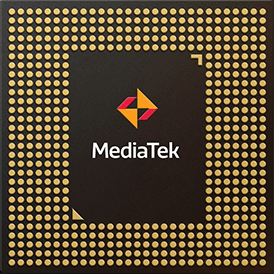
MediaTek MT6738 Benchmark, Test and specs
Last updated:
The MediaTek MT6738 has 4 cores with 4 threads and is based on the 1. gen of the Mediatek MT-Serie series. The processor was released in Q2/2016. The MediaTek MT6738 scores 127 points in the Geekbench 5 single-core benchmark. In the Geekbench 5 multi-core benchmark, the result is 408 points.

| Name: | MediaTek MT6738 |
|---|---|
| Family: | Mediatek MT-Serie (72) |
| CPU group: | MediaTek MT67xx (17) |
| Architecture: | Cortex-A53 |
| Segment: | Mobile |
| Generation: | 1 |
| Predecessor: | -- |
| Successor: | -- |
CPU Cores and Base Frequency
The MediaTek MT6738 has 4 CPU cores and can calculate 4 threads in parallel. The clock frequency of the MediaTek MT6738 is 1.50 GHz. The number of CPU cores greatly affects the speed of the processor and is an important performance indicator.
| CPU Cores / Threads: | 4 / 4 |
|---|---|
| Core architecture: | normal |
| Cores: | 4x Cortex-A53 |
| Hyperthreading / SMT: | No |
|---|---|
| Overclocking: | No |
| Frequency: | 1.50 GHz |
| Turbo Frequency (1 Core): | -- |
| Turbo Frequency (4 Cores): | -- |
Internal Graphics
The MediaTek MT6738 has integrated graphics, called iGPU for short. Specifically, the MediaTek MT6738 uses the ARM Mali-T860 MP2, which has 32 texture shaders and 2 execution units. The iGPU uses the system's main memory as graphics memory and sits on the processor's die.
| GPU name: | ARM Mali-T860 MP2 |
|---|---|
| GPU frequency: | 0.35 GHz |
| GPU (Turbo): | 0.35 GHz |
| Compute units: | 2 |
| Shader: | 32 |
| Hardware Raytracing: | No |
| Release date: | Q4/2015 |
| Max. displays: | 2 |
|---|---|
| Generation: | Midgard 4 |
| Direct X: | 11 |
| Technology: | 28nm |
| Max. GPU Memory: | -- |
| Frame Generation: | No |
Hardware codec support
A photo or video codec that is accelerated in hardware can greatly accelerate the working speed of a processor and extend the battery life of notebooks or smartphones when playing videos.
| h265 / HEVC (8 bit): | Decode / Encode |
|---|---|
| h265 / HEVC (10 bit): | Decode |
| h264: | Decode / Encode |
| VP8: | Decode / Encode |
| VP9: | No |
| AV1: | No |
|---|---|
| AVC: | No |
| VC-1: | No |
| JPEG: | Decode / Encode |
Memory & PCIeThe processor can use up to 4 GB memory in 1 (Single Channel) memory channels. The maximum memory bandwidth is 5.3 GB/s. The memory type as well as the amount of memory can greatly affect the speed of the system. |
|
| Memory type: | Memory bandwidth: |
|---|---|
| LPDDR3-667 | 5.3 GB/s |
| Max. Memory: | 4 GB |
| Memory channels: | 1 (Single Channel) |
| ECC: | No |
| PCIe: | |
| PCIe Bandwidth: | -- |
Thermal ManagementThe thermal design power (TDP for short) of the processor is . The TDP specifies the necessary cooling solution that is required to cool the processor sufficiently. The TDP usually gives a rough idea of the actual power consumption of the CPU. |
|
|---|---|
| TDP (PL1 / PBP): | |
| TDP (PL2): | -- |
| TDP up: | -- |
| TDP down: | -- |
| Tjunction max.: | -- |
Technical details
The MediaTek MT6738 is made in 28 nm. The smaller the manufacturing process of a CPU, the more modern and energy-efficient it is. Overall, the processor has 0.00 MB cache. A large cache can greatly speed up the processor's speed in some cases such as games.
| Technology: | 28 nm |
|---|---|
| Chip design: | Chiplet |
| Socket: | -- |
| L2-Cache: | -- |
| L3-Cache: | -- |
| AES-NI: | No |
| Operating systems: | Android |
| Virtualization: | None |
|---|---|
| Instruction set (ISA): | Armv8-A (64 bit) |
| ISA extensions: | -- |
| Release date: | Q2/2016 |
| Release price: | -- |
| Part Number: | -- |
| Documents: | Technical data sheet |
Rate this processor
Benchmark results

The benchmark results for the MediaTek MT6738 have been carefully checked by us. We only publish benchmark results that have been created by us or that have been submitted by a visitor and then checked by a team member. All results are based on and fullfill our benchmark guidelines.
Geekbench 5, 64bit (Single-Core)
Geekbench 5 is a cross plattform benchmark that heavily uses the systems memory. A fast memory will push the result a lot. The single-core test only uses one CPU core, the amount of cores or hyperthreading ability doesn't count.

|
MediaTek MT6752M
8C 8T @ 1.50 GHz |
||

|
AMD E1-1500
2C 2T @ 1.48 GHz |
||

|
AMD GX-412TC
4C 4T @ 1.40 GHz |
||
|
|
MediaTek MT6738
4C 4T @ 1.50 GHz |
||

|
MediaTek MT6737T
4C 4T @ 1.50 GHz |
||

|
Qualcomm Snapdragon 616
8C 8T @ 1.70 GHz |
||

|
Qualcomm Snapdragon 435
8C 8T @ 1.40 GHz |
||
Geekbench 5, 64bit (Multi-Core)
Geekbench 5 is a cross plattform benchmark that heavily uses the systems memory. A fast memory will push the result a lot. The multi-core test involves all CPU cores and taks a big advantage of hyperthreading.

|
AMD A6-4455M
2C 2T @ 2.60 GHz |
||

|
Intel Pentium 2129Y
2C 2T @ 1.10 GHz |
||

|
Intel Pentium T2370
2C 2T @ 1.73 GHz |
||
|
|
MediaTek MT6738
4C 4T @ 1.50 GHz |
||

|
Intel Celeron N2807
2C 2T @ 2.16 GHz |
||

|
Intel Celeron 847
2C 2T @ 1.10 GHz |
||

|
Intel Pentium T2330
2C 2T @ 1.60 GHz |
||
iGPU - FP32 Performance (Single-precision GFLOPS)
The theoretical computing performance of the internal graphics unit of the processor with simple accuracy (32 bit) in GFLOPS. GFLOPS indicates how many billion floating point operations the iGPU can perform per second.

|
Qualcomm Snapdragon 215
Qualcomm Adreno 308 @ 0.50 GHz |
||

|
Qualcomm Snapdragon 425
Qualcomm Adreno 308 @ 0.50 GHz |
||

|
Qualcomm Snapdragon 427
Qualcomm Adreno 308 @ 0.50 GHz |
||
|
|
MediaTek MT6738
ARM Mali-T860 MP2 @ 0.35 GHz |
||

|
Samsung Exynos 7578
ARM Mali-T720 MP2 @ 0.65 GHz |
||

|
Samsung Exynos 7580
ARM Mali-T720 MP2 @ 0.65 GHz |
||

|
Qualcomm Snapdragon 439
Qualcomm Adreno 505 @ 0.45 GHz |
||
Estimated results for PassMark CPU Mark
Some of the CPUs listed below have been benchmarked by CPU-monkey. However the majority of CPUs have not been tested and the results have been estimated by a CPU-monkey’s secret proprietary formula. As such they do not accurately reflect the actual Passmark CPU mark values and are not endorsed by PassMark Software Pty Ltd.

|
Intel Atom Z3775
4C 4T @ 1.46 GHz |
||

|
Intel Pentium E2210
2C 2T @ 2.20 GHz |
||

|
AMD E-350D
2C 2T @ 1.60 GHz |
||
|
|
MediaTek MT6738
4C 4T @ 1.50 GHz |
||

|
Intel Atom Z3560
4C 4T @ 1.83 GHz |
||

|
Intel Celeron J3060
2C 2T @ 2.48 GHz |
||

|
Intel Pentium 987
2C 2T @ 1.50 GHz |
||
Benchmarks

Geekbench 5 (SC)
2,488 entries
2,488 entries

Geekbench 5 (MC)
2,461 entries
2,461 entries

FP32 SP (iGPU)
2,039 entries
2,039 entries

PassMark CPU-Mark
2,392 entries
2,392 entries
Popular comparisons
back to index










